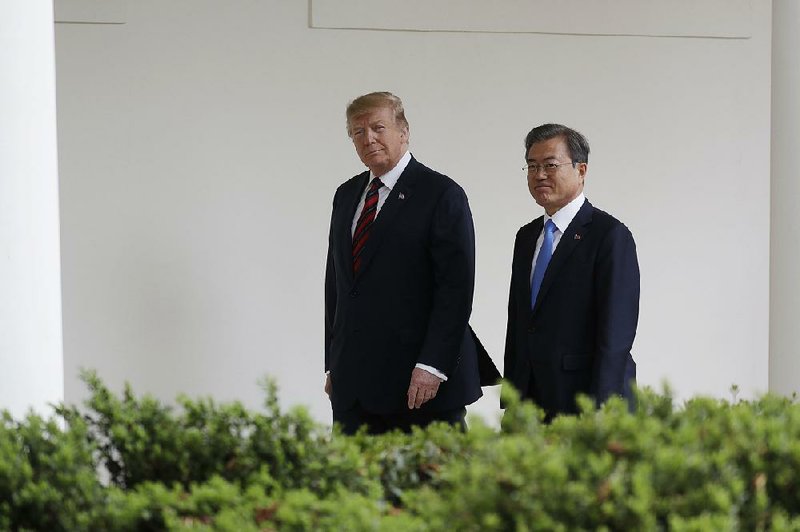TOKYO -- Kim Jong Un said North Korea should prove its self-reliance and deliver a "telling blow" to the hostile foreign forces who mistakenly believe sanctions will bring his country to its knees.
The comments, reported Thursday by state media outlets, represent Kim's first official response to the breakdown of the second U.S.-North Korea summit in February, and were delivered to a plenary session of officials from the ruling Workers' Party of Korea.
They also come as South Korean President Moon Jae-in met Thursday with President Donald Trump in Washington, as he tries to find a way to mediate between the United States and North Korea and restart a stalled dialogue.
Kim underlined the need to "vigorously advance socialist construction" based on North Korea's own efforts, technology and resources, "under the uplifted banner of self-reliance, so as to deal a telling blow to the hostile forces who go with bloodshot eyes miscalculating that sanctions can bring the DPRK to its knees."
Kim's remarks were delivered Wednesday but reported Thursday by the Korean Central News Agency. The DPRK refers to the country's official name, the Democratic People's Republic of Korea.
"Kim is showing that he's confident enough not to feel any urgent pressure under the sanctions," said Lim Eul-chul, an expert on the North Korean economy at Kyungnam University in Seoul.
"Indeed, North Korea has beefed up significant resilience against sanctions over a long period of time," he added. "His latest message is that North Korea will further develop self-reliance rather than give in to Washington's demands."
Over the past week, Kim made four publicized visits to economic-related projects from a beach resort to a department store. Although Kim extended the deadline for the completion of the Wonsan-Kalma resort until April 2020, experts said the trips were designed to demonstrate the resilience of North Korea's economy.
On Tuesday, Kim also stressed the need to maintain the party's strategic line of focusing on economic development, with a "spirit of self-reliance," given what he called the current "tense situation," according to the Korean news agency.
"The Supreme Leader urged the need for leading officials to fully display a high sense of responsibility and creativity, and the revolutionary spirit of self-reliance and fortitude in an attitude befitting the masters of the revolution and construction under the prevailing tense situation and thus follow through on the new strategic line of the party," he told his ruling Politburo.
Kim's remarks came ahead of Thursday's meeting of North Korea's Supreme People's Assembly, the first session since last month's "elections," when voters were forced to approve the party's choices in single-candidate seats.
In Washington, Trump said the U.S. wants to keep economic sanctions in place to pressure Kim to denuclearize. But Trump said he retains good relations with Kim and didn't rule out a third summit or taking steps to ease food or other shortages in the repressive nation.
"We want sanctions to remain in place," Trump said at the White House. "I think that sanctions right now are at a level that's a fair level."
Moon, for his part, has called for an easing of sanctions, including those holding back joint economic projects between North and South Korea. But he didn't speak to the sanctions issue as he and Trump spoke with reporters at the start of their talks.
Trump said he would favor easing those sanctions at the right time but added: "This isn't the right time." He said he was open to discussing smaller steps, such as helping to ease North Korea's humanitarian problems, but that, in general, the U.S. wants sanctions to remain.
"There are various smaller deals that maybe could happen," Trump said.
"You could work out step-by-step pieces, but at this moment, we're talking about the big deal. The big deal is we have to get rid of the nuclear weapons."
Moon said it's important to maintain the "momentum of dialogue" and express a positive outlook to the international community that a "third U.S.-North Korea summit" will be held.
"I'd like to express my high regard for how you have continued to express your trust towards Chairman Kim," Moon said. "And also, you have made sure that North Korea does not deviate from the dialogue track."
On Wednesday, Secretary of State Mike Pompeo offered some wiggle room in the U.S. government's long-standing insistence that sanctions on North Korea will only be lifted once the country fully denuclearizes.
"I want to leave a little space there," Pompeo told the Senate Committee on Foreign Relations. "From time to time, there are particular provisions, if we are making substantial progress, where one might think it's the right thing to do."
"But yes, the enforcement regime, the core U.N. Security Council resolutions, need to remain in place," he added.
Information for this article was contributed by Simon Denyer and Min Joo Kim of The Washington Post; and by Deb Riechmann of The Associated Press.
A Section on 04/12/2019
